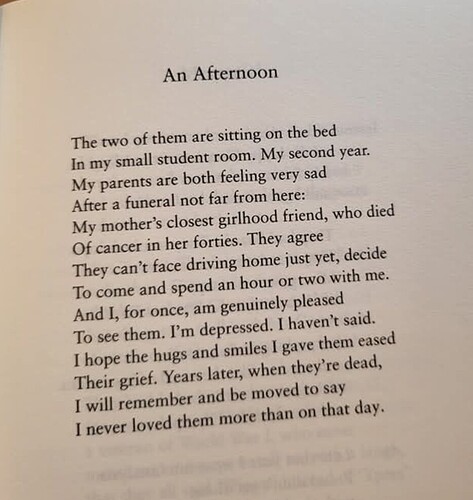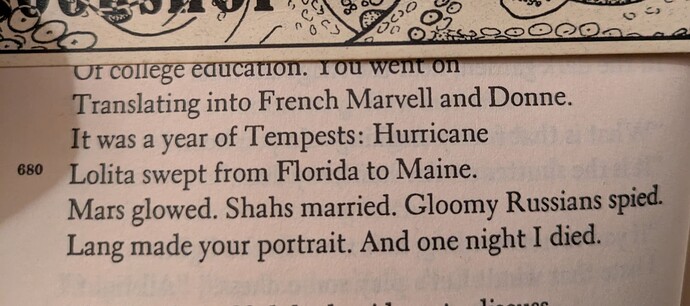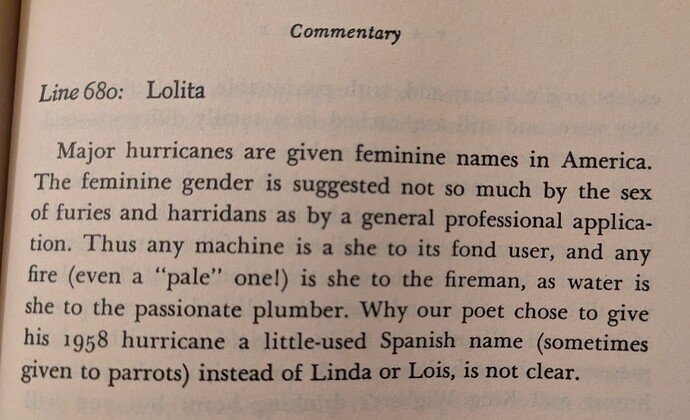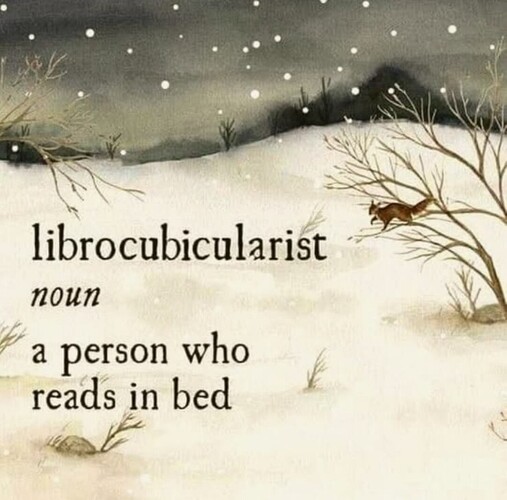
Came here to comment that I’ve been reading Nabokov’s Pale Fire, and it’s a trip. Some critics claim he invented hypertext with this novel (1962). Maybe not, but the intricate interconnections, copious notes, totally unreliable lunatic narrator, geopolitical invention, and authorial interruptions make it feel quite current. I’m enjoying it very much. Your comment reminded me of this funny bit (Lolita had been published a few years earlier, 1955):
Finished:
The book did say some really validating things I needed to hear. Overall, Ben Pechey presents themself in a bright, cheerful, very femme way and at least seems to be an extrovert – so some of the advice about presentation I don’t think really works for me. There was also a lot of general how-to-make-yourself-feel-better advice one can find in many places, but probably somebody needed to hear it. I’m still glad I read it.
Currently reading:
Much more depressing, this is about conservative/fascist politicians (and the kind of religious leaders who are also basically just politicians) using “gender” as a bogeyman. They want to “return” to a patriarchal utopia that never existed, where there is no gender and everything is determined by one’s sex at birth (intersex people of course don’t exist in their fantasy) and they blame/persecute feminists, LGBTQ+ people and “gender theory” for all kinds of stuff.
One of the insights is that conservatives opposed to a thing on the basis of “it’s unnatural” or “goes against God” are absolutely not going to educate themselves about what it is they’re against, because they’re afraid learning about it will corrupt them. Think of the panic over Dungeons & Dragons in the 80s – if the books were sneakily indoctrinating kids into satanism like the fraudsters claimed, then it would be dangerous to read those books or watch a D&D session to verify if the claim was even true. Reading books about gender theory apparently turn people gay (or feminist, trans, atheist, etc.) therefore, they just have to oppose it without knowing what it is. Super frustrating.
That’s…ambitious of you! I remember being entranced by Lolita, especially the writing (likely enhanced by N’s wife Vera, I think I’ve heard), so I tried Pale Fire. It wasn’t enough of a story for me, and the jumping around with footnotes and such felt tedious. I should try again, though.
Meanwhile, since Samantha Harvey’s Orbital won the Booker I gave it a chance, despite my aversion to sci fi and sciency fiction. I was disappointed, especially since I thought two shortlisters – Creation Lake and James – were both far better. I did learn some things about space station life, and there is some great writing, but the lack of character development and plot left me cold, and anxious for the last page.
It’s true, I do enjoy “difficult” books on occasion. This one is relatively short, only about 300 pages. Multiple bookmarks came in handy.
Have to reread Pale Fire sometime. If you are ever in the Shenandoah Valley, stop by Pale Fire Brewing in Harrisonburg, VA. IMHO, it is best brewery in the state, built in an old ice house.
“I recall seeing him from my porch, on a brilliant morning, burning a whole stack of drafts in the pale fire of the incinerator…”
Currently finishing " The Art Thief: A True Story of Love, Crime, and a Dangerous Obsession" by Michael Finkel. From the publisher, “Stéphane Bréitwieser is the most prolific art thief of all time.
He pulled off more than 200 heists, often in crowded museums in broad daylight.
His girlfriend served as his accomplice.
His collection was worth an estimated $2 billion.
He never sold a piece, displaying his stolen art in his attic bedroom.
He felt like a king.
Until everything came to a shocking end.
In this spellbinding portrait of obsession and flawed genius, Michael Finkel gives us one of the most remarkable true-crime narratives of our times, a riveting story of art, theft, love, and an insatiable hunger to possess beauty at any cost.”
Finished up Charlie Jane Anders, which is excellent! Highly recommended… I then read Darkly by Leila Taylor… If you have an interest in Black history and goth, then it’s a nice merging of the two. Very thoughtful, and lyrical at points.
Now I’m reading Chuck Tingle’s Camp Damascus but have not gotten too far into it. So far, no butt pounding, but an interesting start with some kids at a camp, and the main character noticing someone odd.

Kids, as in older teens… not kids, kids… the plot is a horror story about teens who have been sent to a Christian conversion therapy camp.
Okay, I’m putting this here because I just ordered “The Great Gatsby” (how much did he steal from Zelda on that, I wonder?) so I can see what all the fuss is about. I think the closest I read in h.s. to his stuff would’ve been “Ragtime” by E. L. Doctorow. (aside: i wonder if that book is banned now? it has some clinically-graphic stuff, lol.)
There’s some copyrighted material in it; that’s why there’s some silent scenes.
OMG at the end of Rogue Protocol when Miki dies I’m standing there on the assembly line, literally wiping away tears!
Seriously
For the past two months I have been rereading “History of the Peloponnesian War.” I am so far on page 75.
I have no idea how the original Greek was written, but this translator is going out of his way to make the content as dry and heavy as possible.
I’m starting to read it a bit fast now. It’s like I have had to retrain my brain how to focus on long, convoluted sentences. I think I have gotten used to skimming the internet too much. I would read some of these sentences, and by the time I got to the end I would forget how it started.
It’s like training my mind to run a literary marathon, which is an appropriate metaphor considering the subject matter.
Perhaps Greek authors were paid by the word too.
Apparently in a very subtle, difficult to translate way.
They literally based their idea of “good writing” on how clever, abstruse, convoluted, subtle, and refined their language was. If it wasn’t using rhyme and rhythm and structure and allusion and subtle tricks of meaning, then it clearly wasn’t very good.
Merely communicating an idea didn’t count. Any common schmuck could communicate an idea. But it took years of very expensive training to know the correct meters, and to know all the right books to allude to, and generally to have been trained in all the tricks that made other educated people recognise you as a Very Clever Author.
That’s why De Bello Gallico was so revolutionary. Caesar was, first and foremost, a soldier. He was noble and literate, so he probably knew all the things he should have been doing in theory, he just didn’t have any time for any of that, so he wrote it like he was writing a sitrep. It’s just that he was, you know, Julius fucking Caesar, so the literary establishment couldn’t just ignore him as a semiliterate jarhead.
TL;DR: Yes, Classical Greek writers were paid by the word to write in as complicated and difficult-to-translate a way as possible.




